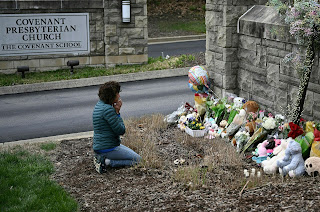On Palm Sunday, After A Tragedy
This is a version of a brief reflection I will be offering at the beginning of our worship service this Sunday.
Every Sunday, as we prepare to worship, I am mindful that many of us carry heavy hearts. I especially feel that this week. Even beyond our normal private and public griefs, I know a number of us feel a special weight from the school shooting in Nashville. It was a school connected to our denomination, the Presbyterian Church in America. While I don’t know the elders or members of Covenant Pres personally, several of my friends do, and that closeness makes it particularly searing to see the faces of children, who have been ripped from the world by unspeakable evil.
We can struggle to worship at times like this. We can struggle to pray and sing and declare our hope in the Lord. It can feel small and hollow.
Today is Palm Sunday, the beginning of Holy Week, when we remember our Savior’s grief. His betrayal. His abandonment. His murder. This Friday we will join in a service of darkness, marking the darkness of the cross. And yes, there is Easter coming. There is hope and joy and life at the end of things. But that doesn’t remove our experience of the darkness. Not in Holy Week. Not in this world, where 9-year-olds are gunned down.
Facing that shadow, there is this striking moment we remember today.
Palm Sunday marks the triumphal entry, where crowds welcome Jesus into Jerusalem and hail him. “Hosannah to the Son of David. Blessed is He who comes in the name of the Lord.” For Jesus hearing the crowds, I suspect their cries felt bittersweet. He knew what was coming. He knew that soon they would turn to shouts of “crucify Him.”
But the triumphal entry is not the striking moment I’m thinking of. It comes a few hours later. Jesus has come into Jerusalem and cleansed the temple, but as he sits and teaches, the children are continuing to sing. “Hosannah to the Son of David. Blessed is He who comes in the name of the Lord.” And the Pharisees ask Jesus to tell the kids to be quiet. But Jesus refuses and instead says, “I tell you, if these were silent, the very stones would cry out.”
Why does he say this? Why does he defend the children’s songs as so necessary?
Even in the darkness, especially in the darkness, the act of worship is essential for our souls. It roots us in realities greater than our pain. It opens a doorway in the dark room of grief, letting light spill in. It is an act of defiant hope that is essential even as we carry the unspeakable weight of sadness.
I have watched someone I loved dearly die. In that room, in that space, what we did was worship. We prayed and sang old hymns. We sang “It Is Well With My Soul” as she drew her final, rasping breaths. I sang those songs like I was dying and they were a lifeline keeping me afloat. And I sang them like I was going to war, declaring to the kingdom of death, “You are king no longer. Hosannah to the Son of David. The reign of death has come to an end.”
That is what we are doing this morning. Clinging desperately to a deeper hope and crying defiantly for the restoration of all things.
So let us prepare our hearts to worship the Lord.
